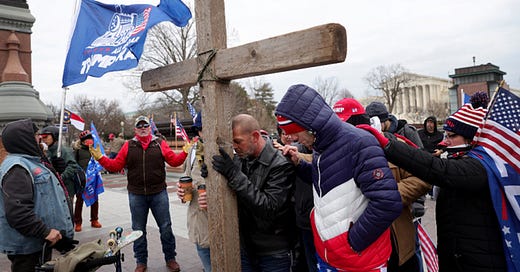SAR Snapshot: The Ambiguities of "Christian Nationalism"
On the importance of clarity around language and coalitions

For the past few months, I have been following closely the ongoing discussion about Christian nationalism. Last week, David French and Ross Douthat gave voice to many of my own thoughts. So rather than repeating what they have said, I thought I’d use this post to underscore one of the most important observations from David French: “If you’re alarmed by the rise of Christian nationalism, the single worst thing you can do is define it too broadly.”
French’s critique extends beyond the debate about Christian nationalism and reflects broader trends toward polarizing and charged rhetoric. It’s akin to describing one’s opponents as not simply “wrong” but actually “evil.” Or the 2012 Obama campaign calling Mitt Romney a charlatan and a liar.
The point is as much pragmatic as it is normative: When you expend all of your rhetorical firepower on hyperbole and overgeneralizations, you won’t have anything left when you have to confront the people who come much closer to actually embodying the labels you’ve been using. If every political opponent is evil, then what’s left to describe terrorists and school shooters? If Mitt Romney is a charlatan, then what can you say when Donald Trump comes along?
As French, Douthat, and many others have noted, Christian nationalism is a growing concern. There are a nontrivial number of people in this country who believe it should be a Christian nation. In his recent article, Douthat elaborates on what this belief holds: “America should unite religion and politics . . . with religious law enforced by the government, a theocratic or confessional state, an established form of Christianity, and non-Christian religions disfavored.”
This belief is not compatible with a pluralistic democracy. And the more its adherents grow in number, the more the danger increases. Importantly, this danger—at least at present—is more about politics than it is about violence. One can acknowledge the horror and spectacle of January 6th while recognizing that it remains an outlier event. Most self-described Christian nationalists are not engaging in criminal action; they are voting. That is a political problem in need of a political solution.
Effective politics depends on compromise and coalitions. And the kind of effective politics necessary to defeat the rise of Christian nationalism is no exception. As I wrote in a post earlier this year:
If large segments of this country really believe that some parts of evangelicalism pose an existential threat to the future of this country, then they will need to partner strategically, charitably, and generously with evangelicals seeking to live faithfully and neighborly, even while disagreeing with them over other important issues. If the future of democracy really is at stake, this is not the time for purity tests and narrow coalitions.
The blue bastions of much of higher education, elite journalism, and coastal cities will not be able to defeat Christian nationalism on their own. They will need the help of a lot of people who don’t think or look much like them. And one place to start is by narrowing the scope of their rhetoric: Calling all of your ideological opponents “Christian nationalists” is not much of a strategy for coalition-building.
Of course, the viability and danger of Christian nationalism is not simply a product of liberals’ failure to build coalitions. Conservative Christians who reject the label of nationalism too often fall short in the opposite direction by failing to draw clear lines in their institutional and informal networks. Often, the same Christians who are rigid gatekeepers against “liberal” or “progressive” theology (however defined) lack similar standards when it comes to policing the theology of their right flank. And their unwillingness to draw lines against Christian nationalism too often signals tacit acceptance of it.
Defeating the growing threat of Christian nationalism will take more charity and graciousness from parts of the Left and more courage and integrity from parts of the Right. On both sides, the path forward will be aided by greater clarity about the terms of the debate.





Agreed—-I wrote some similar thoughts here, would be honored if you took a look. https://open.substack.com/pub/atberg/p/what-critics-often-get-wrong-about-christian-nationalism?r=6mggd&utm_medium=ios
For those, like Dan Mazzucco, without direct access to the NY Times, here's a paywall free link to the Douthat column. https://www.nytimes.com/2024/03/01/opinion/christian-nationalism.html?unlocked_article_code=1.bU0.--Fx.UU0_FvOkrihR&smid=url-share
And here's David French's: https://www.nytimes.com/2024/02/25/opinion/christian-nationalism.html?unlocked_article_code=1.bU0.9O1f.qJs866dLK87D&smid=url-share